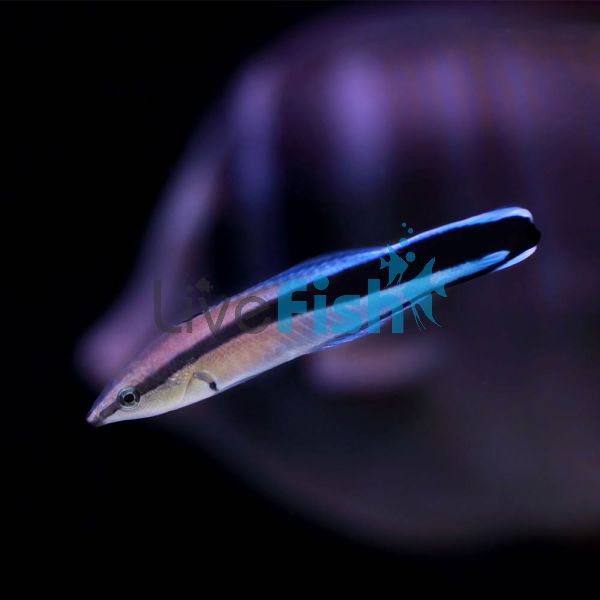Cleaner Wrasse - Medium
Cleaner wrasse are non-aggressive, pretty little fish. These small guys will help out bigger fish by removing parasites and dead tissue from their body, fins and mouth. They hang around “cleaning stations” that the “host” fish come and visit.
Cleaner Wrasse
The Cleaner Wrasse ( Labroides dimidiatus ) is a small elongated fish with a pointed snout. Colors include black, blue, silver, and white. It has protruding tweezer-like teeth which come in useful for removing parasites and other particles from bigger fish. Cleaner wrasse has been known to remove gills and live tissue by accident so keep an eye on them.
They are found in coral reefs and lagoons in the Indo-Pacific region and can grow to a maximum size of 5 1/2 inches (14cm).
Cleaner Wrasses' main natural carnivorous diet consists of ectoparasites and dead tissue from the fish that visit the wrasse’s cleaning station.
Tank Recommendations for Cleaner Wrasse
The minimum size of your tank should be at least 50 gallons (190 liters). As mentioned before the cleaner wrasse should be housed with plenty of larger suitable fish due to diet and eating habits.
Suitable Tank Buddies
Cleaner wrasse should never be kept with shy, anti-social fish as their constant pestering may cause other fish to become anxious.
Usually Compatible
Species such as Angelfish, Goatfish, and Blennies are all good choices for a peaceful tank.
Sometime Compatible
Caution should be taken when considering species such as Groupers, Hawkfish, and Parrotfish.
Rarely Compatible
Species that are definite no-nos include Pufferfish and Boxfish. These fish are easily harassed so it’s best not to keep them with these types of Wrasse. Frogfish, Lizardfish, and Scorpionfish should also be avoided as they have been known to eat them.
Feeding Your Cleaner Wrasse
Give them a diet of small quantities of fresh meaty foods such as brine shrimp. Once your wrasse has adjusted to the aquarium try it with a little seaweed sheet or high-quality marine flakes. The most nutritious food will be found by having plenty of tank mates that the wrasse can clean properly. Feeding is the hardest part of keeping these types of fish.
| Scientific Name | Labroides Dimidiatus |
|---|---|
| Care Level | Moderate |
| Common Names | Cleaner Wrasse, Cleaner fish, Common Cleaner fish, Common Cleaner Wrasse and Bluestreak Cleaner Wrasse |
| Diet | Carnivore |
| Fish Family | Labridae |
| Lifespan (years) | 4 |
| Max. Length (cm) | 15 |
| Min. Tank Volume (l) | 190 |
| Origin | Indo-Pacific |
| Reef Safe | Yes |
| Sociability | Peaceful |
| Venomous | No |
| Water Conditions | 22.2-25.5° C (72-78° F), dKH 8-12, pH 8.1-8.4, sg 1.020-1.025 |




